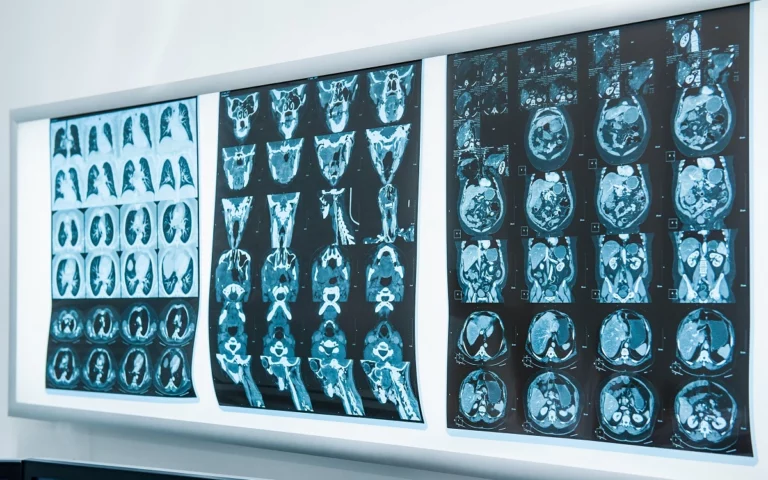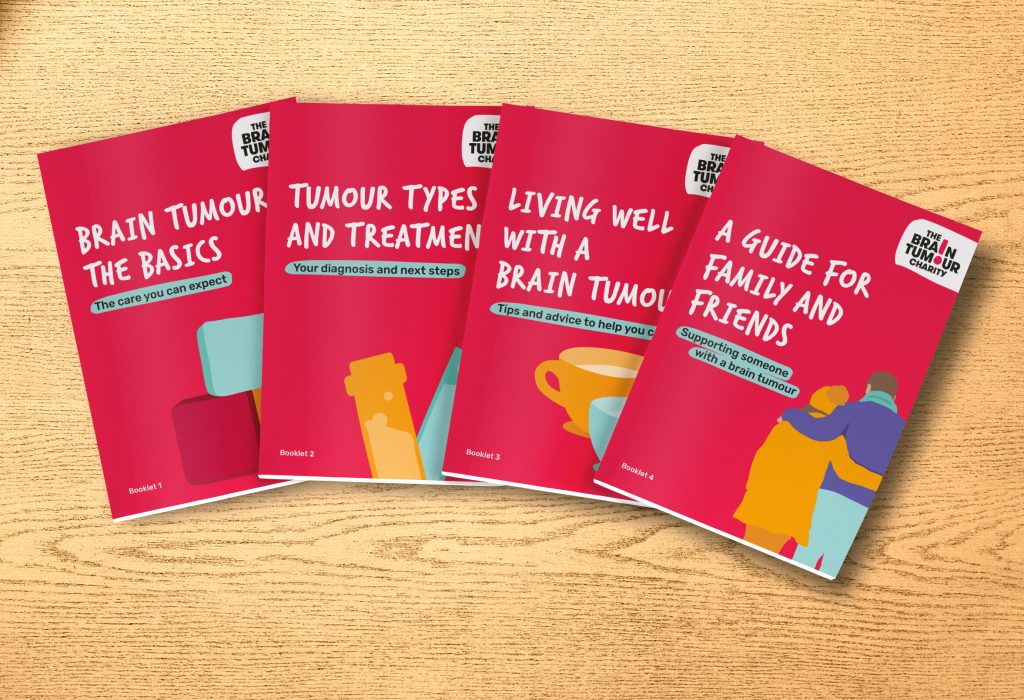What causes brain tumours?
Generally, there is nothing you could have done, or not done, that would have prevented you from getting a brain tumour.

Short summary
Primary brain tumours often develop when mistakes happen in normal cells’ behaviour. These mistakes can create abnormal cells, which can grow and form a mass of cells. But, while this is how they develop, what causes brain tumours? Why do the cells stop behaving normally?
Very often, the answer is that we just don’t know what causes brain tumours. Understandably, this can be one of the most difficult things to accept and can leave you feeling helpless and frustrated.
But, it is thought that only 3% of brain tumours in the UK are preventable.
That being said, there are some risk factors that we believe are linked to brain tumours. On this page, we’ll look at these risk factors as well as the changes in cells that can start brain tumours.
Below, we’ll discuss:
- What causes brain tumours?
- Non-preventable brain tumour risk factors
- Preventable brain tumour risk factors
- Other risk factors
Get support
If you would like more information or just a listening ear, the members of our kind and approachable Support Team are here for you.
Free counselling service
If you would like to talk to someone, we offer up to eight free counselling sessions to anyone diagnosed with a brain tumour or their loved ones.
Get your free Information Pack
Our Brain Tumour Information Pack can help you better understand your diagnosis and feel confident talking to your medical team.
What causes brain tumours?
The causes of brain tumours are still being investigated. While we know that a change in cells can cause primary brain tumours, we still need to understand why this happens.
Research is looking at genetic and molecular changes that can occur in individual cells to better understand this change.
You can read more about how brain tumours develop on our page: What is a brain tumour?
Brain tumour risk factors we know about:
Non-preventable
-
According to Cancer Research UK, inherited genetics are thought to account for a very small proportion of brain tumours.
By inherited genetics, we mean a gene or genes, passed down by one of your parents, in the egg or sperm, which make your cells slightly more likely to make a mistake when dividing and copying genes. As a mistake could be made in a gene involved in cell growth, this gives you a slightly higher risk of developing a brain tumour.
But it does not mean that you will develop a brain tumour.
With that in mind, the following factors therefore may affect your risk of developing a brain tumour:
- If an immediate family member (parent or sibling) has a tumour of the central nervous system, you may have a slightly higher chance of developing a brain tumour, although it is important to stress that the risk is still very low.
- If you have one of the following, relatively rare, genetic conditions, your risk of developing a brain tumour is increased:
- neurofibromatosis (NF) type 1 and type 2
- tuberous sclerosis (TSC)
- Von Hippel-Lindau syndrome (VHL)
- Li-Fraumeni syndrome
- Turcot syndrome
- Turner syndrome
- Gorlin syndrome
There is nothing you could have done to prevent developing a brain tumour in these cases.
Preventable brain tumour risk factors
Cancer Research UK estimates that 3% of brain tumours in the UK are preventable. These are caused by:
-
Ionising radiation is thought to increase the risk of developing a brain tumour. And, about 1% of brain tumours are thought to be caused by this.
Ionising radiation includes X-rays and gamma rays, such as those used in X-rays, CT scans or radiotherapy.
We know that ionising radiation increases the risk of any tumour developing, so, the risk of developing a meningioma or glioma is higher if you had radiotherapy to the head as a child, particularly before the age of five.
Due to this and the known risk of learning difficulties, health professionals therefore try to avoid giving radiation to the brain of a young child under 3 years old.
Radiotherapy in any situation is not given without very careful consideration and you would not have been given radiotherapy unless the expected benefits outweighed any possible risks to you. The same applies to X-rays, gamma rays, and CT scans.
Other factors you may have heard of as being a risk or causing brain tumours
-
Non-ionising radiation includes the type of radiation from mobile phones and power lines. It has less energy than ionising radiation, as used in X-ray and radiotherapy machines, so cannot change our cells in the same way.
You may have read articles about mobiles or power lines causing brain tumours, but research remains inconclusive and, at present, there is no clear link between exposure to mobile phones or power lines and brain tumours.
In 2011, a large study by the International Agency for Research on Cancer (IARC) found no increase in risk of glioma or meningioma (the two most common types of brain tumour) nor acoustic neuroma, for low and moderate phone users. And, recent studies have backed up these findings.
There were suggestions of an increased risk of glioma and acoustic neuroma for the very heaviest mobile phone users, but problems with the design of the study meant that it was not possible to come to a definite conclusion.
Two large, more reliable studies found no links between mobile phones and brain tumours, with a possible exception of a type of brain tumour called an acoustic neuroma. However, an update to this study 2 years later, with more data, found no evidence.
The idea that mobile phones might cause cancer began in the 1990s when they first became common in many households. This idea gained more ground when statistics showed a 34% increase in the diagnosis of brain tumours in the 20 years after this. However, as Cancer Research UK points out, mobile phone ownership in that time has increased by about 500%, so if mobiles were the cause, you would expect a higher rise in the diagnosis of brain tumours. It is likely that the rise in diagnosis is due mainly to better detection and reporting of brain tumours.
In addition, a further study on acoustic neuroma suggested that people who use mobile phones are more likely to notice symptoms of acoustic neuromas, such as hearing loss, and seek medical help. So using a mobile phone could increase the chance of detecting the disease, but not affect the chance of developing it in the first place.
Research is still ongoing.
-
People with HIV or AIDS have an increased risk of developing a type of brain tumour called a CNS lymphoma. The reason for this is not completely understood, but it is likely to be due to the weakening of the immune system, particularly in advanced/late stages of HIV/AIDS. In almost all cases of CNS lymphoma, a virus called the Epstein-Barr virus is found.
However, anti-retroviral medicines, which help to slow down the progression of HIV, also lower the risk of developing neurological effects of HIV/AIDS, such as CNS lymphomas.
-
Around 2% of brain tumours are thought to be caused by obesity.
There is now evidence that women who are overweight or obese have an increased risk of developing a type of brain tumour called a meningioma.
There is also some evidence that children born weighing more than 4kg (8lbs 13oz) are at a higher risk of developing types of brain tumours called astrocytoma or embryonal tumours.
It is important to remember that the risk is still very low. And if you are overweight and develop one of these types of brain tumour, this does not mean that this was the cause.
-
Some studies have shown an increase in the risk of developing certain types of brain tumour. This is because of the following factors:
- age (people aged 75 years and over)
- gender (slightly more females develop brain tumours than men)
- previous cancer
(childhood brain and other solid tumours, non-Hodgkin lymphoma, leukaemia, melanoma, thyroid or prostate cancers).
Support and Information Services
Research & Clinical Trials Information
You can also join our active online community.
In this section

Get support
If you need someone to talk to or advice on where to get help, our Support and Information team is available by phone, email or live-chat.
Recommended reading

Share your experiences and help create change
By taking part in our Improving Brain Tumour Care surveys and sharing your experiences, you can help us improve treatment and care for everyone affected by a brain tumour.
